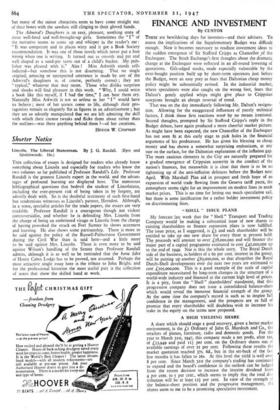FINANCE AND INVESTMENT
By CUSTOS
THESE are bewildering days for investors—and their advisers. To assess the implications of the Supplementary Budget was difficult enough. Now it becomes necessary to readjust investment ideas to the sudden emergence of Sir Stafford Cripps as Chancellor eof the Exchequer. The Stock Exchange's first thoughts about the dramatic change at the Exchequer were reflected in an all-round lowering of quotations. Gilt-edged stocks, made especially vulnerable by the over-bought position built. up by short-term operators just before the Budget, were an easy prey to fears that Daltonian cheap money policy might be substantially revised. In the industrial market, where speculators were also caught on the wrong foot, fears that Dalton's gently applied whips might give place to Crippsian scorpions brought an abrupt reversal of trend.
That was on the day immediately following Mr. Dalton's resigna- tion. Allowing for the exaggerated influences of purely technical factors, I think those first reactions were by no means irrational. Second thoughts, prompted by Sir Stafford Cripps's reply in the Budget debate, have again produced a more cheerful market picture. As might have been expected, the new Chancellor of the Exchequer has not seen fit at this early stage to pick holes in the financial arguments of his predecessor. He has given his blessing to cheap money and has shown a somewhat surprising enthusiasm, at any rate on the surface, for the Daltonian explanation of the inflation gap. The more cautious elements in the City are naturally prepared for a gradual emergence of Crippsian austerity in the conduct of the nation's finances, but meanwhile it is clear that there is to be no tightening up of the anti-inflation defences before the Budget next April. With Marshall Plan aid in prospect and fresh hope of an expansion of world trade flowing from the Geneva tariff pacts, the atmosphere seems right for an improvement on modest lines in stock market prices. This is no time for letting out much speculative sail, but there is some justification for a rather bolder investment policy on discriminating lines.
" SHELL " ISSUE PLANS
My forecast last week that the " Shell " Transport and Trading Company would be making a substantial issue of new shares to existing shareholders to finance expansion plans is now fulfilled. The issue price, as I suggested, is £3 and each shareholder will be entitled to take up one new share for every three at present held. The proceeds will amount to over £28,000,000 and will finance the major part of a capital programme estimated to cost f,42,000,000 up to the end of Nor is this the whole story. The Royal Dutch side of the business, as holders of a 6o per cent. interest in the group, will be putting up another L63,000,000, so that altogether the Royal Dutch-Shell developments over the next two years are estimated to cost L105,000,000. This is a good example of the scale of capital expenditure necessitated by long-term changes in the structure of a world-wide industry and financed at the current high level of prices. It is a pity, from the " Shell " shareholders' standpoint, that this progressive company does not issue a consolidated balance-sheet which would reveal the immense financial strength of the group. At the same time the company's record is such as to inspire full confidence in the management, and the prospects are so full of promise that every shareholder will doubtless wish to increase his stake in the equity on the terms now proposed.
A HIGH YIELDING SHARE
A share which should stage a good recovery, given a better market environment, is the Li Ordinary of John G. Murdoch and Co., tit: retailers of pianos, furniture, radio and domestic goods. For the year to March 31st, 1947, this company made a net profit, after tax, of £53,949 and paid ill per cent. on the Ordinary shares out of available earnings of over 21 per cent. Following these results the market quotation reached 37s. 6d., but in the set-back of the last few months it has fallen to 26s. At this level the yield is well over 8 per cent. Since March 31st the company's trading has continued to expand and the board's confidence in the outlook can be judged from the recent decision to increase the interim dividend from 4 per cent. to 5 per cent., which seems to imply that the total dis- tribution will be at least I21 per cent. In view of the strength of the balance-sheet position and the progressive management, tha shares seem to me to be a promising speculative investment.


































 Previous page
Previous page